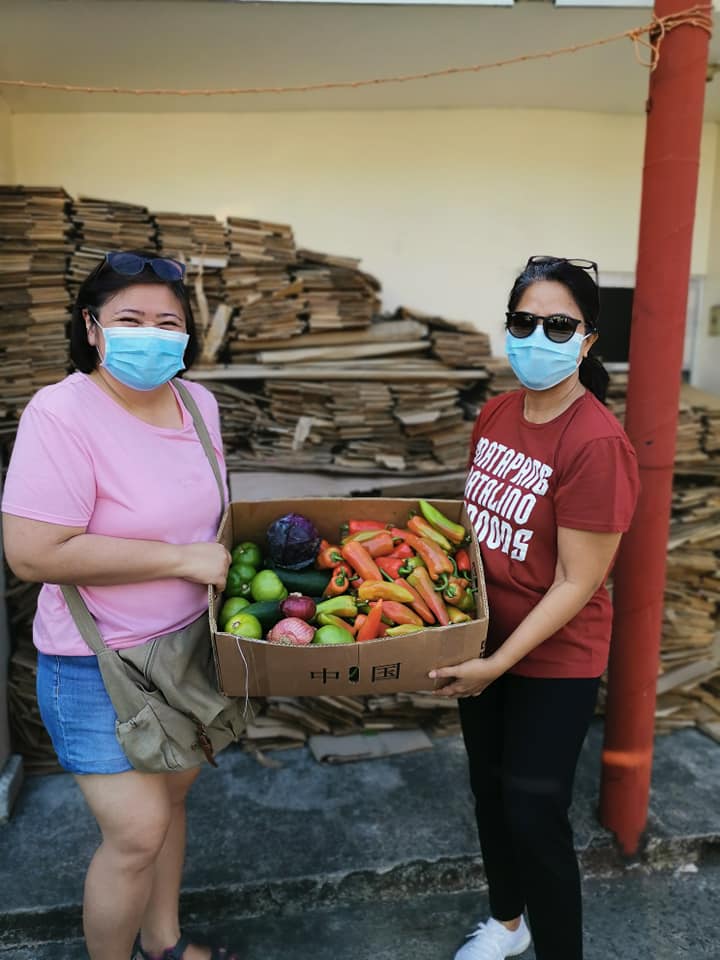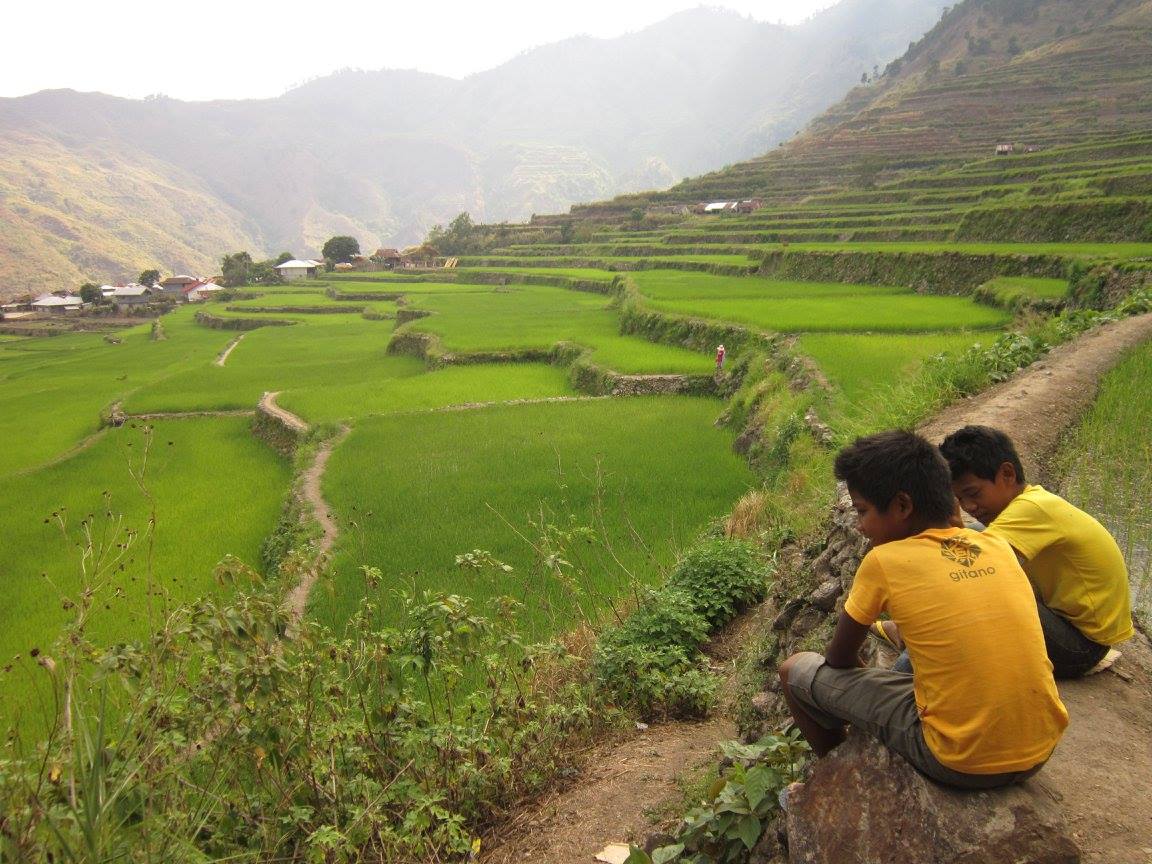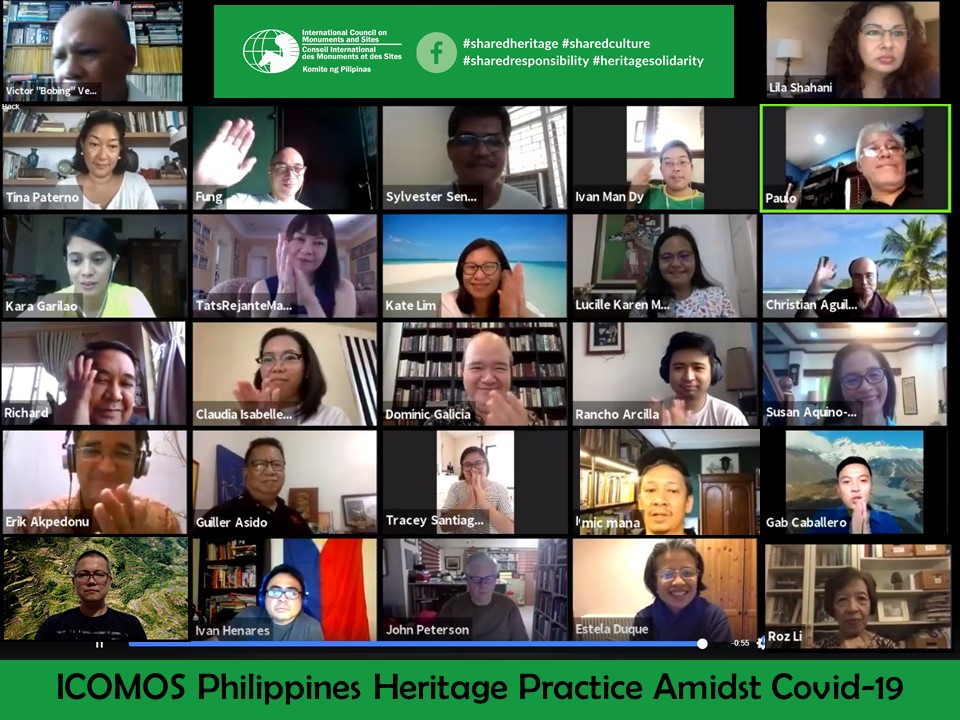ICOMOS Philippines members came together online last April 25 to discuss the topic entitled, “Heritage Practice Amidst Covid 19”. This discussion is seen as the first step in exploring collective strategies to adapt to new challenges amidst the global pandemic for Filipino heritage practitioners. Members living in different parts of the Philippines, United States, Singapore, Hong Kong, United Kingdom, Germany and Egypt shared their current situation, challenges and prognosis of Covid-19 in their heritage practice during the 2-hour discussion.
INITIAL FINDINGS
While the pandemic has threatened the heritage practice, many still viewed the resulting changes in the new heritage landscape as opportunities. Following were common experiences:
A. Stalled projects due to site inaccessibility and suspension of government-funded projects or work with local government projects;
B. The recent memo from Department of Budgets to keep ‘non-essential’ industries alive results in diminished spending for heritage and mass layoffs for the creative industry;
C. Difficulty in engaging students with online learning
“The mandatory pause caused by the lockdown was still perceived to have some benefits. It enabled professionals to be freed from daily work routines and focus on research, writing or tangential projects, and re-evaluate and re-frame current heritage practices, policies, and narratives to meet the new challenges in a post-COVID world.”
With the coming budget cuts for culture, and with restricted movement even after lockdown, the depression in heritage sector activity is perceived to last a while. Despite common experiences of : a) stalled heritage projects due to limitations of site-specific work; b) diminished government spending on culture and the arts; c) breaks in supply chains that prevent access to essential products and service needed for projects; d) sluggish online learning among students, members saw possibilities in circumstances to better the heritage landscape.
The field of archaeology (education and practice) is severely disabled as they are most reliant on site-specific work or visits. However, some community work continues where local counterparts are active. They report the lack of visitors has enabled the sites to rest, and noticeable improvements in natural sites from this short break. Practitioners in architecture, landscape architecture, urban planning and conservation are able to make do with existing documentation of their sites, although the extent of their work depends largely on how well documented the site is.
As the education shifts to online learning, educators meet difficulty in keeping students engaged and are searching for more creative ways online teaching. Other teachers have been given a mandate on a pass grade because not all students have network connections. Only the archaeology sector has suspended school terms because site work is impossible.
Site managers and heritage-related institutions report moving to digital platforms for a) virtual engagement with the site and b) participation in intangible heritage practices normally held on site. Others report focusing on protecting the sector by first accumulating baseline data on impact to culture.
The economist pointed out that the economy can only pick up when people and goods can move freely. Until a vaccine becomes widely accessible, people will move with restraint and likely keep to virtual experiences. The heavier speculation in the real estate market from depreciation, which could put more heritage structures more at risk.
So far, the only national government-related initiative is through the National Committee for Culture and Arts, which will provide grants for the heritage sector. Its heritage arm, the National Commission on Monuments and Sites (in which ICOMOS has representation) has been allocated 3 million pesos (USD 60,000) as a national grants fund.
The possibilities
Despite this news, the mandatory pause caused by the lockdown was still perceived to have some benefits. It enabled professionals to be freed from daily work routines and focus on research, writing or tangential projects, and re-evaluate and re-frame current heritage practices, policies, and narratives to meet the new challenges in a post-COVID world.
Ultimately, all professionals agreed that in this new status quo where heritage preservation will be dwarfed by more urgent national priorities of health, peace and order and food security, the larger question, why is heritage still important now, must be answered to be relevant to an audience who feels disconnected from it. Including the heritage narrative into national priorities will be key. Heritage professionals should also capitalise on the captive virtual audience to bring heritage closer.
There is a production of virtual experiences for tangible heritage, such as virtual museum and site tours, or even intangible heritage by online participation of the visita iglesia (a holy week tradition of visiting seven churches on foot) and masses. Even after lockdown ends, virtual experiences are estimated to become part of the new normal, and as such brings into question of our evolving relationship to authenticity. What constitutes an experience, and what will constitute our future experiences of heritage?
Some members shared new initiatives, or old ones that continue despite restrictions:
A. Integrating heritage with essential services and aligning with a priority on national agenda, food security.

Before COVID-19, the small town of Sagada within the Mountain Province of the northern highlands was challenged by mass tourism that threatened their built heritage and natural sites, including several rice terraces and hanging coffins. Farming is essential to maintain the landscape, yet in the last several years, the farming industry diminished because locals were shifting from farming to tour guiding.
The lockdown was called without provision for essential services, therefore transport of farm produce was difficult. The local government of Sagada sought the help of Tracey Santiago, who has worked with the local government and other sectors in their community for the last 6 years, to buy produce and link Sagada farmers to Manila consumers. The Municipal Agriculturist facilitated Department of Agriculture trucks to transport farm produce, now totalling 14 tons purchased, for distribution through an online platform. The higher demand for produce and cessation of tourism revenue can soon convince locals to turn away from tourism and back to farming. The call for farmer support now includes local food tourism enterprises, and the industry moves towards a more sustainable community tourism model beyond COVID-19.
B. Transforming perspectives of intangible heritage and community development
Intramuros: heritage as security
In the Spanish colonial fortification, Intramuros, residents have long felt protected from natural disasters by the fort’s walls. Intramuros Administration has increased its online presence, and although not included in the messaging, the resulting urban myth since the pandemic is that the walls are protecting them from the virus. To date, the residents inside the Intramuros walls are Covid-free.
Adapting to communities
Before COVID-19, Intramuros Administration had planned for the resettlement of the informal community. They are now evaluating the possibility of maintaining these residents for the longer term, and beginning an urban vegetable garden for their use.
C. Creating knowledge for the future.
Heritage research pushes forward.
The development of knowledge, amidst lockdowns have stirred practitioners to write, complete their research and learn new things while staying at home.
The experiences, artefacts and life-hacks during this time of Covid-19 will become the primary source for future generations to learn from for future global pandemics. For the first time in history, hundreds of history and civic organizations are coalescing to build something bigger: an initiative to use our shared experience to power the future.
D. Online communications
Ifugao Rice Terraces: work continues
For a decade, Stephen Acabado, an anthropological archaeologist has worked largely from UCLA, California on the WHS of the Ifugao Rice Terraces, through a local partner. Although site visits are no longer possible, this work continues almost seamlessly despite Covid-19 because of this long-standing partnership.
If you would like to know more about this initiative, please get in touch with Gabriel Caballero, ICOMOS Philippines Communications Officer at communications[at]icomosphilippines[dot]com


